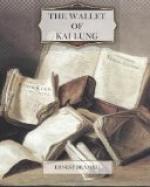These illustrious ones, being the greatest, were the first to take Yin’s attention, but beyond them he beheld an innumerable concourse of Emperors who not infrequently outshone their majestic predecessors in the richness of their apparel and the magnificence of the jewels which they wore. There Yin perceived Hung-Hoang, who first caused the chants to be collected, and other rulers of the Tcheon dynasty; Yong-Tching, who compiled the Holy Edict; Thang rulers whose line is rightly called “the golden,” from the unsurpassed excellence of the composed verses which it produced; renowned Emperors of the versatile Han dynasty; and, standing apart, and shunned by all, the malignant and narrow-minded Tsing-Su-Hoang, who caused the Sacred Books to be burned.
Even while Yin looked and wondered, in great fear, a rolling voice, coming from one who sat in the midst of all, holding in his right hand the sun, and in his left the moon, sounded forth, like the music of many brass instruments playing in unison. It was the First Man who spoke.
“Yin, son of Yat Huang, and creature of the Lower Part,” he said, “listen well to the words I speak, for brief is the span of your tarrying in the Upper Air, nor will the utterance I now give forth ever come unto your ears again, either on the earth, or when, blindly groping in the Middle Distance, your spirit takes its nightly flight. They who are gathered around, and whose voices I speak, bid me say this: Although immeasurably above you in all matters, both of knowledge and of power, yet we greet you as one who is well-intentioned, and inspired with honourable ambition. Had you been content to entreat and despair, as did all the feeble and incapable ones whose white bones formed your pathway, your ultimate fate would have in no wise differed from theirs. But inasmuch as you held yourself valiantly, and, being taken, raised an instinctive hand in return, you have been chosen; for the day to mute submission has, for the time or for ever, passed away, and the hour is when China shall be saved, not by supplication, but by the spear.”
“A state of things which would have been highly unnecessary if I had been permitted to carry out my intention fully, and restore man to his prehistoric simplicity,” interrupted Tsin-Su-Hoang. “For that reason, when the voice of the assemblage expresses itself, it must be understood that it represents in no measure the views of Tsin-Su-Hoang.”




